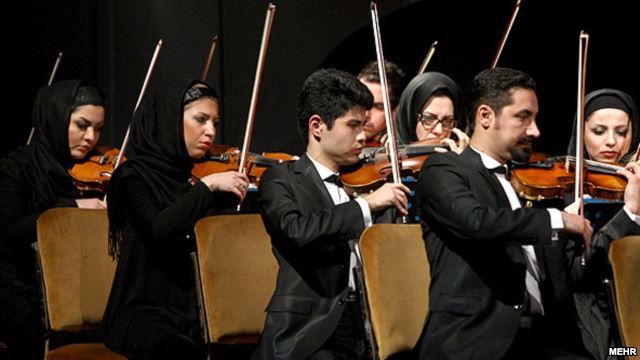 WASHINGTON -- Alexander Rahbari fondly recalls his last stint conducting the Tehran Symphony Orchestra. It was the fall of 2005, Beethoven's Ninth Symphony was on the card, and the Iranian capital's Vahdat Hall was packed.
WASHINGTON -- Alexander Rahbari fondly recalls his last stint conducting the Tehran Symphony Orchestra. It was the fall of 2005, Beethoven's Ninth Symphony was on the card, and the Iranian capital's Vahdat Hall was packed."I conducted Beethoven's Ninth in Tehran for seven nights. If I said I conducted the Ninth for seven nights in New York or Austria, I would be asked if there was anyone in the audience -- after two nights the hall would be empty," Rahbari said.
"But [in Tehran] it was full -- so many people came. Later some newspapers complained that, after returning to Iran after so many years, I conducted the symphony for only seven nights."
The internationally renowned, Iranian-born maestro, had returned triumphant after 30 years in Europe. But shortly after his string of successful performances he resigned and left the Islamic republic in frustration.
At the time, Rahbari wrote an open letter demanding higher salaries for the state-funded orchestra's musicians. Today he explains that they worked for a pittance -- with even the top performers making only about $150 per month, requiring most to take on second or even third jobs to make a living.
"In this regard, Iran could be compared to one of the poorest countries I've had to deal with," Rahbari said.
In 2012, the funding problems that Rahbari and his successors complained about silenced the Tehran Symphony Orchestra, whose roots dating back to the 1930s made it one of the oldest in the Middle East.
Meanwhile, Iran's National Orchestra, founded by Iranian-born composer and conductor Farhad Fakhreddini in 1998, suffered similar difficulties. Fakhreddini himself resigned in 1999, and the orchestra that performed only classical Iranian music dissolved in October 2012.
Late that year, musicians from both orchestras were quoted by Iranian media as saying their contracts had not been renewed and that all performances had been cancelled.
"When we ask for our salaries they calmly say that there was no budget," a musician from the National Orchestra was quoted as saying.
While officials said the measures were being taken to restructure and reorganize the two orchestras, their closure was seen as a death blow by musicians who had never had an easy existence in the Islamic republic.
Corrupt And Decadent
After the 1979 Islamic Revolution, music was considered corrupt and decadent to the ears of religious hard-liners. The tone softened somewhat in the coming years. The annual Fajr International Music Festival, which runs from February 13-20 this year and is considered one of Iran's most prestigious cultural events, began in 1986 under the presidency of former Culture Minister Mohammad Khatami.
In recent years, classical music -- particularly Persian classical -- has become acceptable and used in official ceremonies.
But it cannot compare with the glory days of the 1960s and 1970s, when the Tehran Symphony Orchestra featured some of the worlds greatest musicians, like violin virtuoso Yehudi Menuhin.
The election of President Hassan Rohani in 2013 has provided a glimmer of hope for the country's orchestra scene, however.
"I'm very sorry that the [Tehran] Symphony Orchestra and the National Orchestra have been shut down," Rohani said in a January 8 speech to artists and cultural figures. "This government will revive them in the coming months."
Iran's culture minister, Ali Jannati, added to the optimism when he said at the Fajr International Music Festival last week that the government aims to strengthen music.
But making such promises is easier than fulfilling them.
"Officials in the administrations are able to solve the nuclear issue, and for that reason I don't think solving the [country's] music problems should be any more difficult," said prominent musician Hossein Alizadeh at a January press conference in Tehran.
He questions, however, whether there is sufficient political will to bring about change.
"For years, on different occasions, good issues have been brought up that create excitement but they have finally never been turned into action," Alizadeh said.
The conductor Rahbari concurs:
"He is the only [president] who has uttered the word Symphony Orchestra. One feels proud as an Iranian, particularly after [former President Mahmud] Ahmadinejad, who was [not interested in culture]," Rahbari� said.
"Yet Rohani may think that under Khatami things were better and that it would be good to bring back the orchestra to the state it was under Khatami. But I must say that I left the orchestra because of [problems] that were from Khatami's time, not Ahmadinejad's."
He says that, as a first step, musicians must be taken "seriously."
Keyvan Saket��is a master of the Persian tar, a stringed instrument similar to the lute that has strongly influenced Persian classical music.
He has performed with both the Tehran Symphony Orchestra and the National Orchestra, and says they need extensive financial support.
Musicians, Saket says from Tehran, need a respectable income in order to be able to focus on their music.
"Music, a very influential form of art in any society, has faced a lack of attention in Iran in past years. If you look at the salaries of some of Iran's top musicians, you'll see that it is much lower than the average income," Saket said.
In a recent interview with the Iranian press, composer and conductor Fakhredini was asked if he would ever consider returning to the orchestra he founded.
"I'd like to work," he said, but with caveats: no "financial and moral problems," and� musicians must be allowed to "do our work properly" with no propaganda involved.
By Radio Free Europe/ Radio Liberty
The Iran Project is not responsible for the content of quoted articles.











